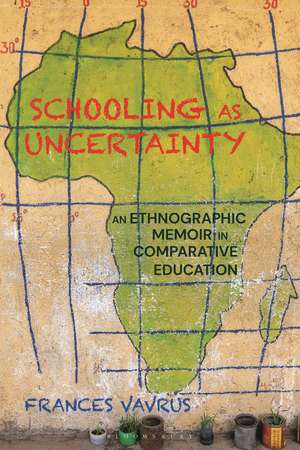Schooling as Uncertainty: An Ethnographic Memoir in Comparative Education
Autor Frances Vavrusen Limba Engleză Paperback – 24 feb 2021
| Toate formatele și edițiile | Preț | Express |
|---|---|---|
| Paperback (1) | 180.88 lei 6-8 săpt. | +47.95 lei 4-10 zile |
| Bloomsbury Publishing – 24 feb 2021 | 180.88 lei 6-8 săpt. | +47.95 lei 4-10 zile |
| Hardback (1) | 424.15 lei 3-5 săpt. | +31.17 lei 4-10 zile |
| Bloomsbury Publishing – 24 feb 2021 | 424.15 lei 3-5 săpt. | +31.17 lei 4-10 zile |
Preț: 180.88 lei
Preț vechi: 208.89 lei
-13% Nou
Puncte Express: 271
Preț estimativ în valută:
34.61€ • 36.23$ • 28.81£
34.61€ • 36.23$ • 28.81£
Carte tipărită la comandă
Livrare economică 31 martie-14 aprilie
Livrare express 21-27 februarie pentru 57.94 lei
Preluare comenzi: 021 569.72.76
Specificații
ISBN-13: 9781350164499
ISBN-10: 1350164496
Pagini: 296
Dimensiuni: 156 x 234 x 26 mm
Greutate: 0.45 kg
Editura: Bloomsbury Publishing
Colecția Bloomsbury Academic
Locul publicării:London, United Kingdom
ISBN-10: 1350164496
Pagini: 296
Dimensiuni: 156 x 234 x 26 mm
Greutate: 0.45 kg
Editura: Bloomsbury Publishing
Colecția Bloomsbury Academic
Locul publicării:London, United Kingdom
Caracteristici
Presents moving stories from young Tanzanian women and men, and from the author, about the uncertainties that schooling cannot eliminate
Notă biografică
Frances Vavrus is Professor of Comparative and International Development Education at the University of Minnesota, USA. She is Chair of the Joint ILO/UNESCO Committee on the Application of the Recommendations Concerning Teaching Personnel and the co-author of Rethinking Case Study Research (2017) and Teaching in Tension (2013).
Cuprins
IntroductionPart I: Shaky Beginnings1. Marital Misgivings2. Spoons, Strikes, and SchoolingPart II: Precarious Parenthood3. A Difficult Delivery4. Preventable DeathsPart III: Fallible Expertise5. Questioning Dr. Spock6: Questioning Corporal PunishmentPart IV: AIDS and the Ordinariness of Crisis 7. Schooling, Sponsorship, and Social Contingency8. The Burden of Care: Grandparents and the AIDS CrisisPart V: Policy Arbitrariness9: Tripping on the Tenure Track 10. Aspirational Equality and the Precarity of PolicyPart VI: The Social Life of Uncertainty11. Speed Bumps on Lema Road12. Gendered ContingenciesEpilogueGlossaryAcknowledgementsReferencesIndex
Recenzii
Fran Vavrus' book is an extraordinary exploration into education, family, and identity. The book showcases her skill as a researcher, the value of long-term reflection on one's own role in the context of international education, and the ways in which women's experiences can be ignored or hidden Her honesty in sharing vulnerable moments in her life, will be illuminating for people at varied points in their own journeys.
Propelled by the author's 30 years of ethnographic experience and her willingness to explore the relationships that have shaped her work, this book provides a lyrical and powerful analysis of the ways that people try-and too often fail-to use formal schooling to make their lives more certain. Its is theoretically pathbreaking, analytically rich, and it asks the questions that need to be at the heart of our understanding of schooling around the world. This is a tour de force.
This book is a compelling and genre-bending exploration of (un)certainty in schooling, development, research, and life itself. Through careful analysis of data and lived experiences, Vavrus calls us to critically question our perceived entanglements with both individuals and institutions.
An unhesitatingly honest critical reflection on research, unfurled as braiding her own life, through marriage, children, and tenure, with the lives of the Tanzanian students she seeks to understand. In the meeting ground of academic discipline and community Frances Vavrus examines confronting, accepting, and domesticating uncertainty.
This extraordinary book, at once raw and inspiring, invites readers into the life of one ethnographer and her engagement with a rural Tanzanian community and its school over almost three decades. Vavrus draws on her collected field notes from Tanzania and her own personal letters and journals to show us how schooling and its intersection with sexuality, child rearing, marriage, work, and public policy have changed over time in East Africa and North America. In an innovative combination of autobiography and ethnography, Vavrus invites us to both question - and celebrate - our precarious efforts to secure our own lives and livelihoods through schooling.
Propelled by the author's 30 years of ethnographic experience and her willingness to explore the relationships that have shaped her work, this book provides a lyrical and powerful analysis of the ways that people try-and too often fail-to use formal schooling to make their lives more certain. Its is theoretically pathbreaking, analytically rich, and it asks the questions that need to be at the heart of our understanding of schooling around the world. This is a tour de force.
This book is a compelling and genre-bending exploration of (un)certainty in schooling, development, research, and life itself. Through careful analysis of data and lived experiences, Vavrus calls us to critically question our perceived entanglements with both individuals and institutions.
An unhesitatingly honest critical reflection on research, unfurled as braiding her own life, through marriage, children, and tenure, with the lives of the Tanzanian students she seeks to understand. In the meeting ground of academic discipline and community Frances Vavrus examines confronting, accepting, and domesticating uncertainty.
This extraordinary book, at once raw and inspiring, invites readers into the life of one ethnographer and her engagement with a rural Tanzanian community and its school over almost three decades. Vavrus draws on her collected field notes from Tanzania and her own personal letters and journals to show us how schooling and its intersection with sexuality, child rearing, marriage, work, and public policy have changed over time in East Africa and North America. In an innovative combination of autobiography and ethnography, Vavrus invites us to both question - and celebrate - our precarious efforts to secure our own lives and livelihoods through schooling.
